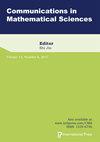Improved uniform error bound on the time-splitting method for the long-time dynamics of the fractional nonlinear Schrödinger equation
IF 1.3
4区 数学
Q2 MATHEMATICS, APPLIED
引用次数: 0
Abstract
We establish the improved uniform error bound on the time-splitting Fourier pseudospectral (TSFP) method for the long-time dynamics of the generalized fractional nonlinear Schrödinger equation (FNLSE) with $O(\varepsilon^2)$-nonlinearity, where $\varepsilon \in (0,1]$ is a dimensionless parameter. Numerically, we discretize the FNLSE by the second-order Strang splitting method in time and Fourier pseudospectral method in space. Combining with energy method, we utilize the regularity compensation oscillation (RCO) technique to rigorously prove the improved uniform error bound at $O(h^{m_0} + \varepsilon^2 \tau^2)$ with the mesh size $h$ and time step $\tau$ up to the long-time at $O(1 / \varepsilon^2)$, which gains an additional $\varepsilon^2$ in time compared with classical error estimates. The key idea behind the RCO technique is to analyze low frequency modes by phase cancellation and control high frequency modes by the regularity of the exact solution. With the help of the RCO technique, we relax some constraints in the previous proof for the improved uniform error bound and extend the result to more general cases. Finally, numerical examples are provided to confirm our improved uniform error bound and demonstrate its suitability in different cases.分数非线性薛定谔方程长时动力学时间分割法的改进均匀误差约束
我们为具有 $O(\varepsilon^2)$ 非线性的广义分数非线性薛定谔方程(FNLSE)的长时动力学建立了时间分裂傅立叶伪谱(TSFP)方法的改进均匀误差约束,其中 $\varepsilon \in (0,1]$ 是一个无量纲参数。在数值上,我们用二阶斯特朗分裂法在时间上对 FNLSE 进行离散,用傅里叶伪谱法在空间上对 FNLSE 进行离散。结合能量法,我们利用正则补偿振荡(RCO)技术严格证明了在网格大小为$h$、时间步长为$tau$的情况下,改进的均匀误差约束为$O(h^{m_0} + \varepsilon^2 \tau^2)$,直到长时间为$O(1 / \varepsilon^2)$,与经典误差估计相比,在时间上增加了$\varepsilon^2$。RCO 技术背后的主要思想是通过相消分析低频模式,并通过精确解的正则性控制高频模式。在 RCO 技术的帮助下,我们放宽了之前证明改进均匀误差约束的一些限制条件,并将结果扩展到了更一般的情况。最后,我们提供了数值示例来证实我们改进的均匀误差约束,并证明它适用于不同情况。
本文章由计算机程序翻译,如有差异,请以英文原文为准。
求助全文
约1分钟内获得全文
求助全文
来源期刊
CiteScore
1.70
自引率
10.00%
发文量
59
审稿时长
6 months
期刊介绍:
Covers modern applied mathematics in the fields of modeling, applied and stochastic analyses and numerical computations—on problems that arise in physical, biological, engineering, and financial applications. The journal publishes high-quality, original research articles, reviews, and expository papers.

 求助内容:
求助内容: 应助结果提醒方式:
应助结果提醒方式:


